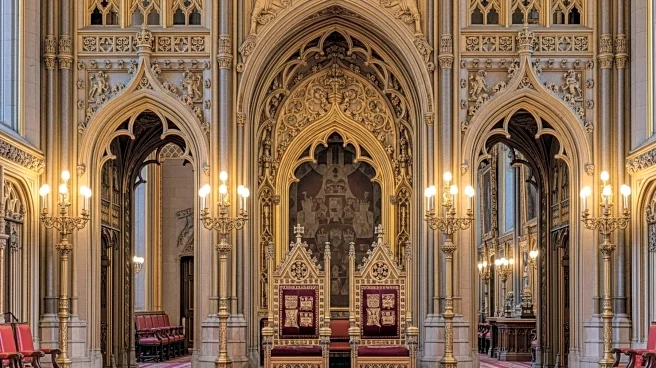What's Happening?
During a state banquet at Windsor Castle, King Charles III and Princess Kate were observed remaining seated while guests stood and applauded at the beginning of President Trump's speech. The event followed a day of ceremonial activities, including a carriage procession. A video clip capturing the moment was shared on TikTok, garnering significant attention with 225,000 views and 26,900 likes. The clip's caption noted the standing ovation, highlighting Kate's decision to sit amid the applause. The incident has sparked discussions on social media, with some users interpreting the action as a potential snub, while others suggest it may have been a matter of protocol.
Why It's Important?
The seating choice by King Charles and Princess Kate during the standing ovation has raised questions about royal protocol and its interpretation. While some view the action as a subtle message regarding their stance towards President Trump, others argue it was a procedural decision. The event underscores the complexities of diplomatic etiquette at royal functions, where actions are often scrutinized for deeper meanings. The incident also highlights the role of social media in amplifying and interpreting such moments, influencing public perception and discourse around international relations and royal engagements.
What's Next?
There is speculation about a potential invitation from President Trump to the royal family to visit the U.S. next year for the 250th anniversary of the Declaration of Independence. However, no official confirmation or invitation has been announced. The possibility of such a visit could further impact diplomatic relations between the U.S. and the UK, offering opportunities for continued engagement and collaboration. Observers will be watching for any developments or official statements regarding this potential visit.
Beyond the Headlines
The incident at Windsor Castle reflects broader themes of diplomatic relations and the influence of protocol in international affairs. It also highlights the cultural differences in how formal events are conducted and perceived. The role of social media in shaping narratives around such events is increasingly significant, as platforms like TikTok provide a space for public engagement and interpretation. This dynamic can affect how diplomatic gestures are understood and can influence public opinion on international relations.










